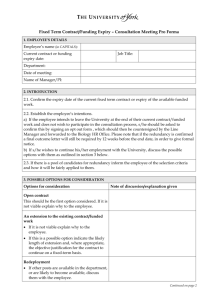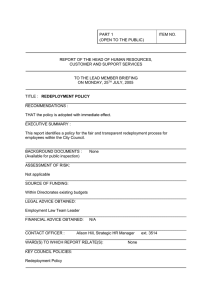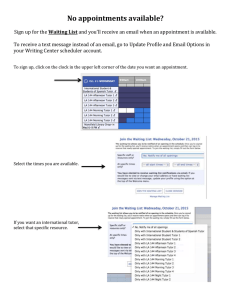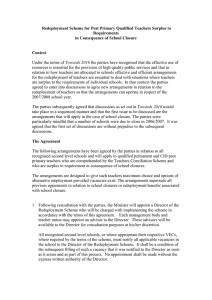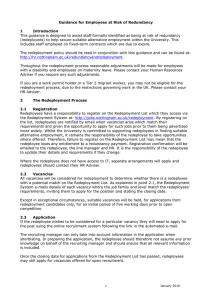REDEPLOYMENT AND FIXED TERM CONTRACTS
advertisement
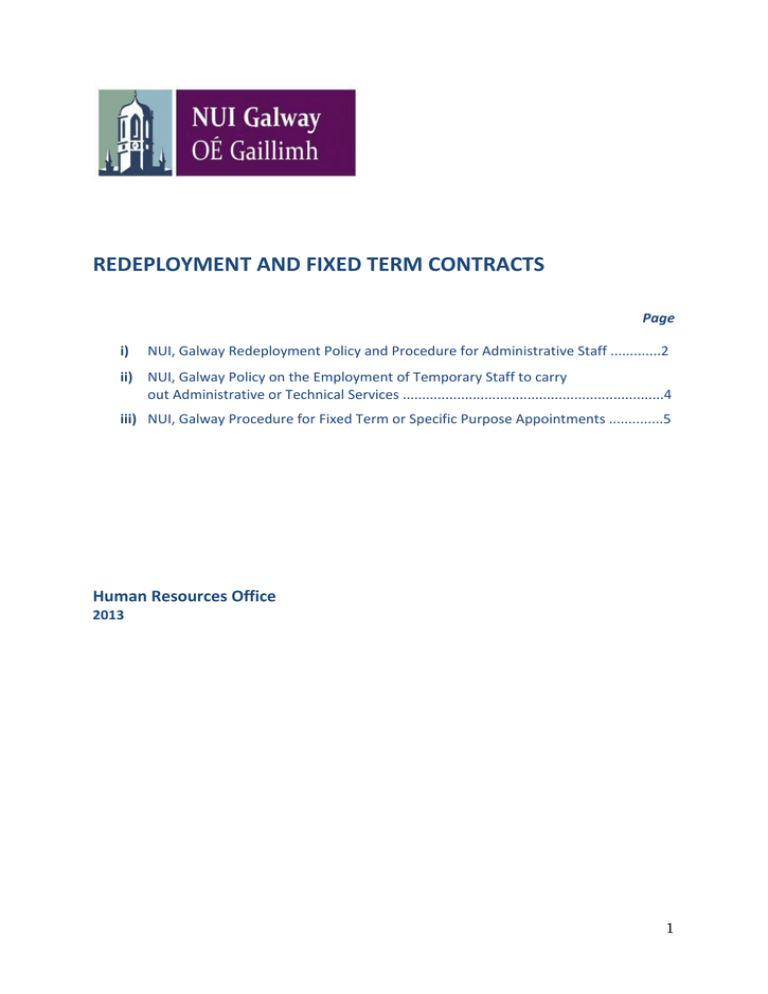
REDEPLOYMENT AND FIXED TERM CONTRACTS Page i) NUI, Galway Redeployment Policy and Procedure for Administrative Staff .............2 ii) NUI, Galway Policy on the Employment of Temporary Staff to carry out Administrative or Technical Services ...................................................................4 iii) NUI, Galway Procedure for Fixed Term or Specific Purpose Appointments ..............5 Human Resources Office 2013 1 (i) REDEPLOYMENT PROCEDURE FOR ADMINISTRATIVE STAFF Introduction The University is cognisant of its responsibilities to ensure as far as possible security of employment for its staff. On occasion, this will require the redeployment of staff to areas where vacancies exist. Such individuals will be assigned to a pool of staff to be deployed to suitable vacancies. Redeployments will, as far as possible, be to posts at the same grade currently occupied by the postholder, but may involve a lower grade. Application of Policy The policy will apply in the following circumstances: where members of staff on contracts of indefinite duration reach the end of a contract or where the funding stream supporting the activity ends; where a member of staff returns from a career break, where the first post they left has been filled and they have an entitlement to the next suitable vacancy; where the University’s organisational needs are such that individual areas are restructured and individual posts become surplus to requirements. In such circumstances, the University will redeploy the individuals using the following procedure. Redeployment Procedure Where an individual is deemed surplus, the HR Office will prepare a case file including: An updated CV of the individual A skills/competency profile of the individual Reason as to why s/he has been added to the redeployment pool Employment history re: previous placements, achievements etc. Completed pro-forma reference from the current line manager The case file will be reviewed within the HR Office to identify the best fit with posts on the current vacancy list and determine the most suitable area for redeployment. To assist this process, detailed job descriptions will be prepared as will a person specification setting out the core skills/competencies for each vacancy. The receiving work unit will be advised of the decision in writing as will the individual member of staff. In exceptional circumstances, where the receiving work unit has significant concerns, the redeployment decision may be reviewed by a Panel consisting of the Director of Human Resources, the Academic Secretary and the Director of Improved Services. In these circumstances, the receiving work unit should set their concerns in writing to the Director of Human Resources within 5 days of the original decision. 2 The Panel will consist of the Director of Human Resources (in the Chair), the Academic Secretary and the Director of Improved Services. The determination of the Panel will be final. It should be understood by all concerned that inherently an individual being redeployed in an area will not have detailed knowledge of the area including particular systems or IT packages. However, they will have a skill set which will allow them to do the job efficiently and effectively after a period of time and the requisite training. The HR Office will ensure that the individuals who are being redeployed will be supported by individual training plans to, as far as possible, the skill set of the individual to that required by the post. The University is fully cognisant that in these circumstances the learning period and the level of support that will need to be provided is more than is normally required and will take this into account when assessing the performance of the individual or the area. However, if, after a reasonable period of time, the member of staff has not integrated, s/he may be considered for other redeployment opportunities. Vacancies will not be filled until the Panel has determined whether or not the post can be filled by redeployment. Individuals who do not accept an offer of reasonable alternative employment may have their employment with the University terminated or forego the right to return. ADDENDUM Technical Posts In light of the collective Agreement in relation to redundancy, no technical vacancy will be advertised externally without being initially advertised amongst research staff. 3 (ii) NUIG POLICY ON THE EMPLOYMENT OF TEMPORARY STAFF TO CARRY OUT ADMINISTRATIVE OR TECHNICAL SERVICES Introduction There are two types of employment contract in law, those that are permanent and those that are temporary. The use of temporary contracts is not only valid but is an important part of the University’s ability to provide services to its students, staff and the public. However, it should be borne in mind that all employment is regulated by Labour Law and it is of fundamental importance that the University has clear policies and procedures that are applied consistently. Moreover we have a responsibility to ensure temporary workers fully understand the nature of their employment. This policy sets out the instances in which temporary employees may be employed in the University to provide administrative or technical services. Legal Framework Employment law is complex and advice should be sought from the HR Office when a work unit is employing someone in a temporary capacity. To put this in perspective, there are more than one hundred ways that employment decisions can be challenged on legal grounds. The main statutes impacting in this area include: The Employment Equality Act, The Unfair Dismissal Acts, The Redundancy Payments Acts, The Fixed Term Workers’ Act, The Working Time Act, The Contracts of Employment Act and The Agency Workers’ Directive. Policy Statement The policy applies to all instances where it is proposed to engage a temporary member of staff, whether for a short period involving days or months or for a longer duration of a period of years. In every instance, approval for the employment must be obtained in advance from HR who will issue the appropriate contract and manage the appointment process. It will not be possible for any individual to be employed by the University without going through this approval process. Individuals carrying out this type of work may not be paid by hourly timesheets in any circumstances without the specific agreement of the HR office. This is necessary in order for the University to manage headcount as required by the Employment Control Framework requirements and to regulate the balance of casual and permanent staff prudently and efficiently. 4 (iii) PROCEDURE FOR FIXED TERM OR SPECIFIC PURPOSE APPOINTMENTS Approval must be obtained from the SSDS and SEMG groups as part of the request to recruit; advice must be sought from HR as to the appropriateness of the appointment. All requests for temporary workers must clearly set out why the appointment is for a temporary period, that is, we must establish the objective ground necessary to validate the temporary nature of the employment. For example the courts have established that the source of funding is in itself not considered an objective ground justifying the use of a fixed term or temporary contract. Once approval has been granted by the University , the case will be referred to HR to manage the appointment process. The HR Office will ensure that the post has been graded and the necessity or otherwise for ‘Irish’ and/or ‘Garda Vetting’ confirmed and then initiate the appropriate procedures to fill the post. In the case of very short term appointments, the HR Office will determine if staff are available to be temporarily deployed from elsewhere in the University. If no one is available, the HR Office will arrange for an agency worker to be appointed. In the case of other short term appointments (months), the job holder should discuss with a member of the HR Office if the request will involve an internal re-organisation. In any event, HR will determine whether the work can be carried out by deploying someone from another part of the University in line with the procedure or if this is not possible, will arrange for an agency worker to be placed. The HR Office is the only Office empowered by the University to engage agency workers and the Finance Office cannot process invoices in respect of employment agencies unless authorised by the HR Office. Longer Term Appointment (years) Once approval has been obtained from the Establishment Control Group, the job owner will meet with a member of the HR Office to confirm that the objective grounds for the temporary employment can stand up to external scrutiny. The HR Office will determine if the post can be covered by redeployment from another area of the University, in line with the procedure. If this is not possible, the post will be advertised internally. Members of staff who secure a fixed term appointment will do so on the clear understanding that at the end of the period, they will return to their substantive post. If that is not possible they will be deployed to a post at their substantive grade. In exceptional circumstances, where the post cannot be filled internally, the post will be advertised externally and the successful candidate will be appointed on a fixed term contract and the employment will cease on the due date. However, s/he will, of course, be able to apply for other University positions once s/he has completed one year’s 5 service and fulfils the service requirements, qualifications, and other conditions that apply to permanent members of staff. Contract Renewals Given that temporary contracts must be granted on a clear objective ground, there can be very few reasons to extend a temporary contract. In these circumstances, approval must be obtained from the Establishment Control Group two months prior to the notice period for the staff member concerned. Transferring a fixed term employee from one project to another project will not, normally, be permitted. 6
